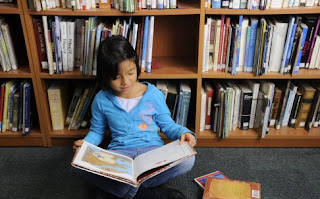PUBLISHED : Tuesday, 01 December, 2015, 6:00am
UPDATED : Tuesday, 01 December, 2015, 6:00am
Hong Kong kids can benefit from reading quality books
Age-appropriate original tales will help build children’s literacy skills
Numerous studies point to the same finding that children who love to read grow up to be more astute, aware, compassionate, resourceful and resilient than those who don’t read for pleasure. Parents and teachers should pause and give thought to what they want to accomplish in getting children to read.
Finding joy and comfort in reading is not the same as having aptitude for language and reading comprehension. Once we embrace the idea that the goal is to develop a child’s passion for reading, and that strong literacy skills are just a necessary by-product, then the path to achieve it will be clear.
Parents and teachers play important roles in children’s reading journey, by modelling the reading habit and providing easy access to quality children’s books.
Children whose book diet consists only of popular mass fiction may not develop the stamina, comprehension and concentration needed to tackle reading assignments in middle school and high school. A strong foundation laid with quality books during each stage of a child’s early years is needed in order for them to appreciate English literature studies, especially when it comes to reading genres outside their area of interest.
Literacy blooms wherever students have access to books they want to read, permission to choose their own, and time to get lost in them
Few children rush at the chance to read Shakespeare’s Macbeth. Don’t give seven- year-olds an abridged version of this masterpiece in dull prose. Instead, give them age-appropriate original tales for about a decade, to help build up their literacy skills. When they finally approach Macbethat age 17, they will appreciate Shakespeare’s language and context, and reap so much more from the experience.
Nancie Atwell, inaugural winner of the Global Teacher Prize and a champion for classroom libraries, states, “Literacy blooms wherever students have access to books they want to read, permission to choose their own, and time to get lost in them. Enticing collections of literature – interesting books written at levels they can decode with accuracy and comprehend with ease – are key to children becoming skilled, thoughtful, avid readers.”
When it comes to choosing books for children, the simple rule is the same for any sales position: know your customer. Your child may already show a preference for certain styles: the illustrations of Diary of a Wimpy Kid, the animal world of Geronimo Stilton, or factual compendia from DK Publishing.
Rather than steer a child away from their preferred genre, an enabling adult can introduce quality books from the same genre: illustrated novels such as Ottoline, animal tales like Babe the Gallant Pig, and illustrated biographies from Peter Sis, such as Starry Messenger, the story of astronomer Galileo. And then add a sprinkling of other books on a multitude of topics, ready for the child to explore at his own pace.
A teacher or librarian who can guide reading choices is an invaluable asset when on the hunt for quality children’s books. If you don’t have access to such a godsend, there is a myriad of print and online resources: book guides from Anita Silvey, Jim Trelease and other literacy experts; book lists and recommendations from public libraries around the world; and web-based literacy programmes like Guys Read for boys and A Mighty Girl for girls. Simply entering book preferences and queries for book suggestions in search engines can yield hundreds of search results to explore. And with the advent of complicated algorithms to determine customers’ shopping preferences, online bookshops can also provide good suggestions.
It is pointless having a child zip through scores of entertaining but unmemorable books, or check the box on classic literature he’s not ready for or not yet interested in. The best sign that you’ve chosen an appealing and inspiring book is a child whois excited enough to re-read parts or all of the tale that he has just finished, and then asks for more books like it.
Annie Ho is board chair of Bring Me A Book Hong Kong (bringmeabook.org.hk), a non-profit organisation advocating for family literacy

